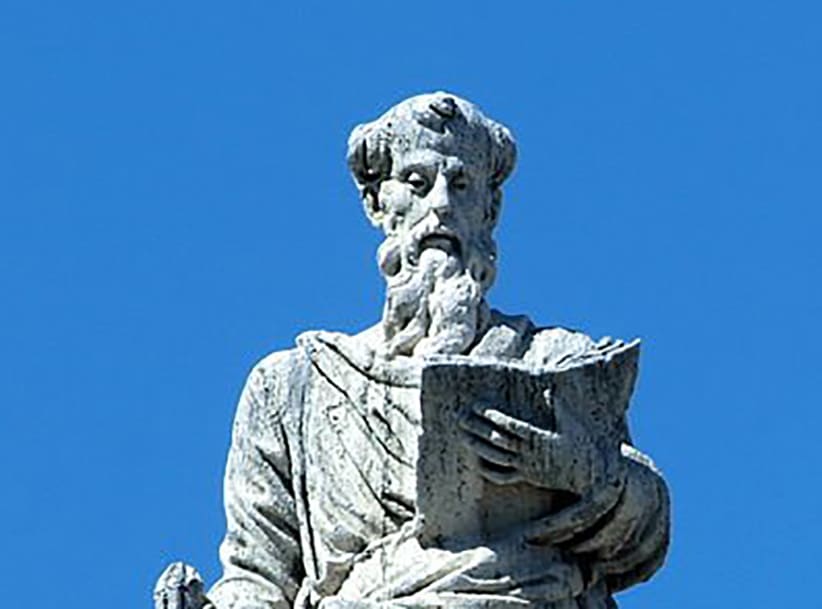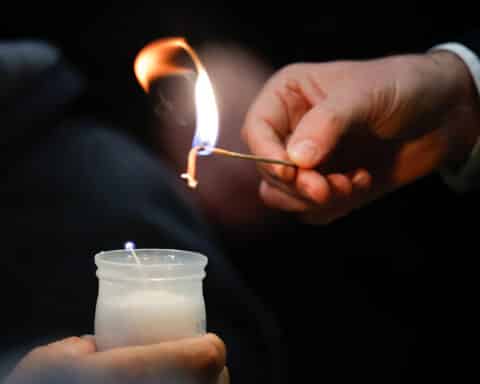
The Prayer of St. Ephrem was my introduction to this fourth-century deacon in the early 1990’s, when my wife and I attended Epiphany of Our Lord Byzantine Catholic Church in Annandale, Virginia. The prayer is rather ambiguously named, because Ephrem wrote many prayers, as well as hundreds upon hundreds of hymns in his 67 years on this earth. Some of those hymns remain in use today in the various Eastern rite liturgies, and the manner in which they infused lay Christians with the truths of orthodox theology in a period marked by debates over the Trinity and the divinity of Christ is the chief reason why St. Ephrem was named a Doctor of the Church in 1920 by Pope Benedict XV.
A case could be made (and I have made it elsewhere) that St. Ephrem the Syrian bears more credit for the triumph of orthodox trinitarianism and Christology than all of the fathers of the Council of Nicaea. While the fathers of first ecumenical council took on the Arian heresy, which explicitly denied that the Son of God was coeternal with the Father and therefore implicitly denied the reality of the Trinity, the promulgation to the people of the orthodox view of the Trinity and Christ’s divinity was accomplished not by the canons of the council but by the hymns of St. Ephrem. Chanted over and over at liturgies across many decades by lay Christians who often could not read or write, those hymns took root in their minds and displaced anything they may have heard about the heterodox ideas of Arius.
In our enlightened age of near-universal literacy, we may find it hard to believe that hymns could hold such power. Yet the U.S. Conference of Catholic Bishops’ Committee on Doctrine noted in September 2020 that “Christian tradition, both Eastern and Western, has from antiquity been acutely aware that hymns and other songs are among the most significant forces in shaping — or misshaping — the religious and theological sensibility of the faithful.” While St. Ephrem does not appear in the committee’s “Catholic Hymnody at the Service of the Church: An Aid for Evaluating Hymn Lyrics,” his spirit pervades the document.
Released in the midst of the pandemic, this document has not received as much attention as it should. That may change as the USCCB’s National Eucharistic Revival ramps up this June. The first case study that the document offers is of hymns whose imprecise language (which is something different from poetic language) strongly suggests that the Eucharist remains bread and wine after the consecration. “A steady diet of these hymns,” the document notes, “would erode Catholic sensibility regarding the fullness of Eucharistic teaching, on the Mass as sacrifice, and eventually on the Church, as formed by that sacrifice.”
Since many parishes have been fed such a steady diet for over five decades, St. Ephrem might well point out that it’s hardly surprising that a 2019 Pew Research study found that even many weekly Mass-goers have come to believe that the Eucharist is merely a symbol of Christ’s body and blood rather than his Real Presence on the altar. No priest offers a homily every week on Eucharistic theology; but many parishioners do not need to open a hymnal to recall the words of the most popular theologically deficient hymns. Imagine if they had memorized these words of St. Ephrem instead: “Let us consume in holy fashion that body / which the people pierced with their nails; / let us drink, as the medicine of life, / the blood which flows from his side.”
St. Ephrem, ora pro nobis.
Scott P. Richert is publisher for OSV.





